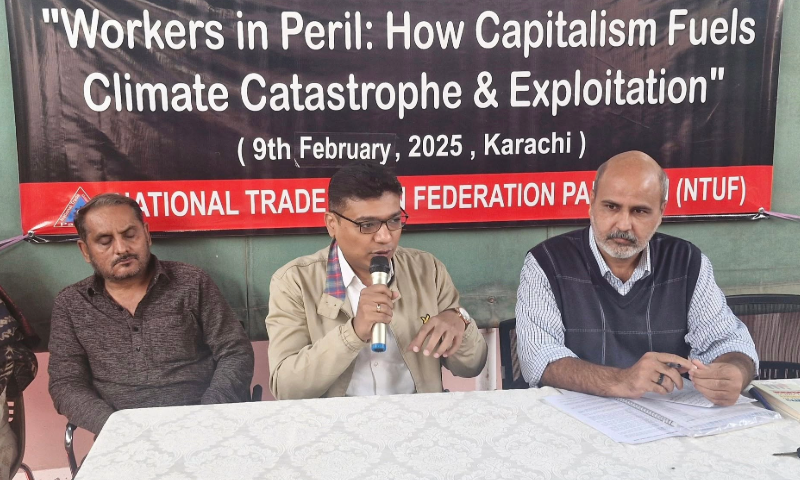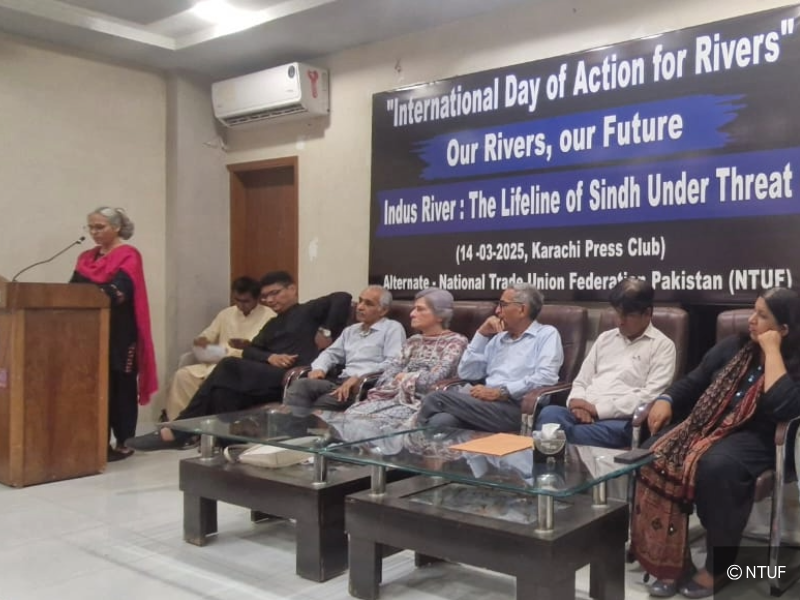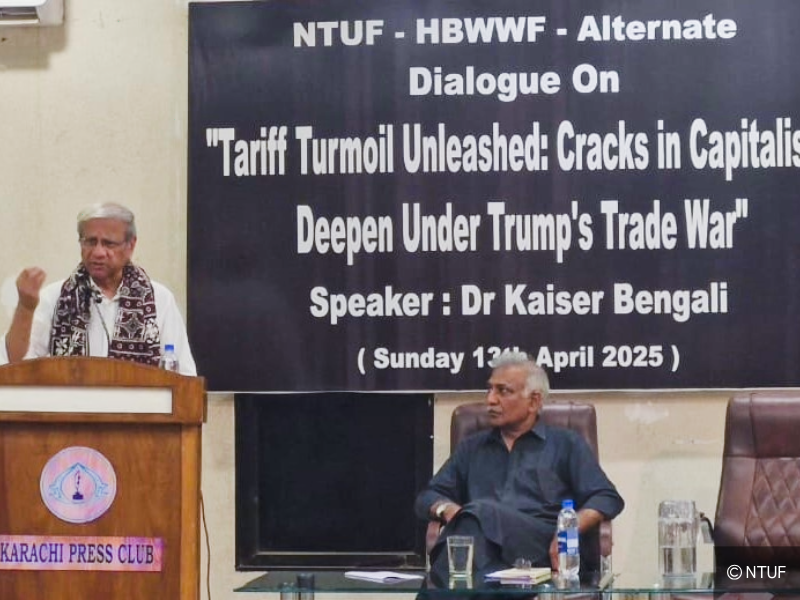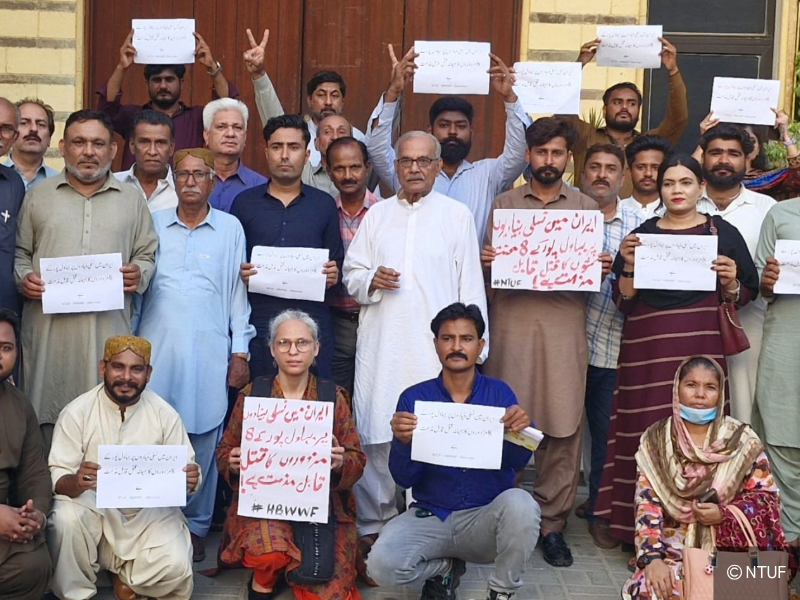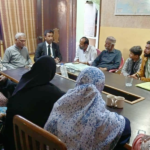
Baldia Factory Victims Raise Concerns Over ILO Compensation
February 6, 2025
NTUF Condemns Police Brutality Against Baloch Women Protesters in Karachi
March 24, 2025KARACHI — Capitalism’s relentless pursuit of profit has pushed the planet to the brink of disaster. The survival of life on Earth now depends on dismantling this exploitative system. “Now or Never” is the urgent call for global action against environmental destruction.
These views were expressed by renowned intellectual Dr. Asghar Dashti at a seminar titled “Workers in Peril: How Capitalism Fuels Climate Catastrophe & Exploitation,” organized by the National Trade Union Federation Pakistan (NTUF). He was joined by NTUF General Secretary Nasir Mansoor, Human Rights Commission of Pakistan’s Sindh Vice Chairperson Khizar Qazi, NTUF Additional General Secretary Riaz Abbasi, and Home Based Women Workers Federation President Saira Feroz.
Dr. Dashti warned that current scientific efforts have not adequately addressed climate change. He cited reports predicting that Pakistan could run out of freshwater by 2050. He explained that climate change is a direct result of burning fossil fuels over the past 500 years, leading to alarming temperature rises of 2.5-3 degrees Celsius. This has caused unprecedented climate disasters and the rise of resilient diseases, with pharmaceutical companies profiting from these crises.
He criticized COP28, highlighting the irony of its host country, the UAE, which relies heavily on fossil fuels. He pointed out that Sultan al Jaber, head of ADNOC—a major contributor to greenhouse emissions—was appointed as chair of the conference. The event ended without concrete commitments, merely promising to “think about reducing emissions” while continuing fossil fuel drilling. He condemned former U.S. President Donald Trump’s withdrawal from the Paris Agreement and noted that capitalist influences block progressive and sustainable policies despite climate justice cases pending in international courts.
Dr. Dashti also referred to the depletion of the Amazon rainforest, warning that the world is losing its lungs and land is becoming less fertile for crops. He emphasized that capitalism’s refusal to reduce profits, even at the planet’s expense, lies at the heart of this crisis.
Mansoor moderated the event and highlighted severe coastal erosion in Pakistan, where 100 acres of land are lost daily to the ocean. He condemned the federal government’s 6 Canal Project for neglecting downstream communities in Sindh. He noted that the aftermath of the 2022 floods has led to reduced agricultural production and severe soil salinization, raising fears of permanent infertility in some lands. Despite Pakistan’s minimal contribution to greenhouse gas emissions, he pointed out that countries in the Global South bear the brunt of climate change impacts.
Mansoor stressed that many people, especially in the working class, often overlook climate issues due to immediate economic and security concerns, even though these issues directly affect their lives and livelihoods. He mentioned how rivers like Malir and Lyari have turned into untreated sewage channels flowing into the sea.
He criticized industrialized nations for failing to take serious steps to prevent environmental catastrophe. The unfulfilled promises made at COP15 in 2009—where developed countries pledged $100 billion annually to help climate-affected developing nations by 2020—expose the COP process as deceptive. Instead of addressing climate change, states have spent $2.4 trillion annually on military expenditures and provided $1.5 trillion in subsidies to fossil fuel industries—an amount equal to the GDP of Russia and Australia combined.
Mansoor warned that rising right-wing forces in developed countries threaten global climate action. He pointed out how Trump’s policies and European right-wing parties’ efforts weaken environmental regulations pose significant risks. Even Germany’s Green Party has prioritized military spending over climate action.
He noted that even organizations like the World Economic Forum have warned that climate-related natural disasters could cause $12.5 trillion in economic losses and result in over two billion healthy life years lost by 2050.
Qazi emphasized that industries worldwide are responsible for 70% of climate change impacts. He warned about the loss of mangroves, mountain ecosystems, and ocean reefs, which significantly affect marine life and fish populations. The increasing frequency of droughts, heavy rains, and wildfires presents unprecedented challenges, with working-class individuals bearing the most significant impacts. He stressed understanding these issues and implementing measures to mitigate effects through alternative energy sources.
Other speakers mentioned that the International Labour Organization (ILO) predicts climate change could cost 80 million jobs by 2030, particularly affecting agriculture, construction, and textiles. Extreme heat already causes 23 million occupational injuries and nearly 19,000 deaths each year; additionally, 26.2 million people suffer from chronic kidney disease due to heat exposure at work. By 2050, heatwaves alone could lead to $7.1 trillion in economic losses, while air pollution could result in nine million premature deaths annually.
They highlighted that Pakistan remains one of the countries most affected by climate change. Recent floods intensified by rapidly melting glaciers have shown devastating consequences. The northern regions—Gilgit-Baltistan and Khyber Pakhtunkhwa—house over 7,000 glaciers, some among the largest globally. In Khyber Pakhtunkhwa alone, there are 3,044 glacial lakes with 33 at critically high water levels, posing an imminent threat to 7.1 million people.
Meanwhile, coastal intrusion in Sindh has submerged over 2.2 million hectares (5.4 million acres) of agricultural land, with an estimated loss of 100 acres daily. Further controversial canal construction aimed at diverting water will only worsen this crisis.
The speakers particularly highlighted the plight of workers affected by heatwaves in agriculture, construction, and textile factories. They also discussed issues related to Palestine and emphasized capital-labor causes while stressing the importance of building narratives around these interconnected challenges. Dr. Dashti called for a climate emergency movement to address these pressing issues.
The speakers concluded that . Pakistan’s working class must actively participate in the climate movement to protect Mother Earth from destruction caused by capitalism.

